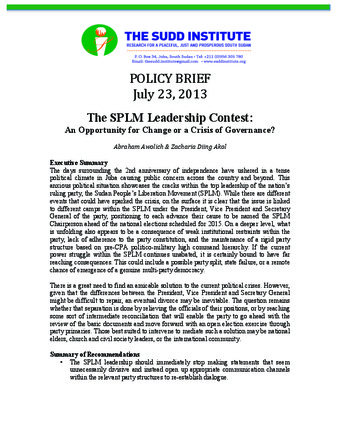SPLM Leadership Contest
Publication Summary
The days surrounding the 2nd anniversary of independence have ushered in a tense political climate in Juba causing public concern across the country and beyond. This anxious political situation showcases the cracks within the top leadership of the nation’s ruling party, the Sudan People’s Liberation Movement (SPLM). While there are different events that could have sparked the crisis, on the surface it is clear that the issue is linked to different camps within the SPLM under the President, Vice President and Secretary General of the party, positioning to each advance their cause to be named the SPLM Chairperson ahead of the national elections scheduled for 2015. On a deeper level, what is unfolding also appears to be a consequence of weak institutional restraints within the party, lack of adherence to the party constitution, and the maintenance of a rigid party structure based on pre-CPA politico-military high command hierarchy. If the current power struggle within the SPLM continues unabated, it is certainly bound to have far reaching consequences. This could include a possible party split, state failure, or a remote chance of emergence of a genuine multi-party democracy.
There is a great need to find an amicable solution to the current political crises. However, given that the differences between the President, Vice President and Secretary General might be difficult to repair; an eventual divorce may be inevitable. The question remains whether that separation is done by relieving the officials of their positions, or by reaching some sort of intermediate reconciliation that will enable the party to go ahead with the review of the basic documents and move forward with an open election exercise through party primaries. Those best suited to intervene to mediate such a solution may be national elders, church and civil society leaders, or the international community.
Summary of Recommendations
The SPLM leadership should immediately stop making statements that seem unnecessarily divisive and instead open up appropriate communication channels within the relevant party structures to re-establish dialogue.
Establishing this dialogue may require intervention from the national elders, such as former vice presidents of Sudan, church and civil society leaders, or from the international community and friends of South Sudan.
The SPLM should reconsider disentangling the election of the chairmanship of the party from the position of the president of the Republic of South Sudan to ensure this pre-election posturing through non-democratic mechanisms does not repeat itself.
In the event that it is not possible for SPLM to hold together as a united party, any split or break of the party should be done in a mature, peaceful manner that keeps intact national integrity, peace and security
Abraham Awolich is the former Managing Director of the Sudd Institute. Awolich’s research has focused on management of development organizations working in conflict mitigation, governance and business management. Awolich is the co-founder of the Sudan Development Foundation and the former Executive Director of New Sudan Education Initiative (NESEI). Previous to joining the Sudd Institute, Awolich helped establish a secondary school in Yei and a medical clinic in Kalthok, Awerial County. Awolich has a Master’s Degree in Pubic Administration from the Maxwell School of Citizenship and Public Affairs at Syracuse University and Bachelor’s Degree from the University of Vermont in Anthropology and Business Administration. Awolich is a McNair Scholar and winner of the prestigious Samuel Huntington Public Service Award in 2006.

